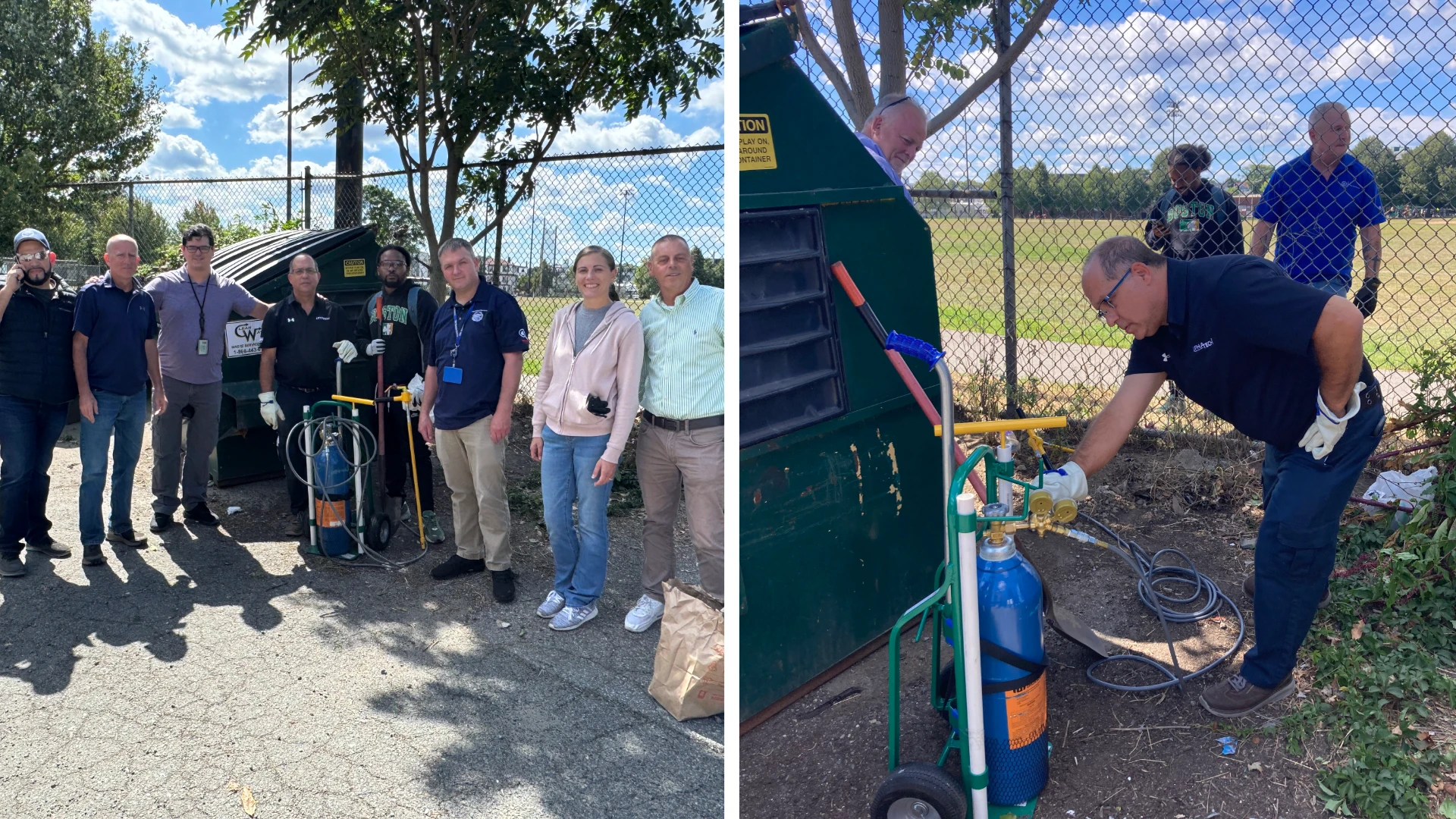
Tweny-nine years ago, Phil Gregory, owner of Gregory Pest Solutions, Greenville, S.C., sat down to interview a young man for his first job out of the Navy. While Gregory saw potential in Gus Walker, he never could have guessed that man would hold just about every position from technician to manager throughout the company, and excel at them all.
Walker himself didn’t foresee his future as a pest control professional. To him, the job was a stepping stone at a company where a couple of friends worked and the owner was a friend of his father.
“At the time, I was just looking for a temporary job until I finished building my first house and completed my education. I was then going to move on to bigger and better things, and something I would enjoy doing every day,” said Walker. “I completed both of my goals 20-something years ago, and as it turned out, I’m still here because pest control is all of those things to me.”
Today, Walker is certified in pest control in South Carolina, North Carolina and Georgia. He’s a certified fumigator in South Carolina and has completed product stewardship training for fumigants. Walker also is a master termite technician, an AIB IPM specialist, a Signature Care food processing facility IPM specialist and has completed the Purdue University continuing education correspondence course in food plant pest management and technology.
With a lengthy list of accreditations and achievements, Walker could have focused his energy in any number of pest control specialties, or excelled at many different positions in the company. “He could have just about any job in the company that he wanted,” said Gregory. “But he likes technician work, he likes solving difficult problems.”
A SOLUTIONS PROVIDER. And as all pest control professionals know, each day brings a new set of problems to solve.
“I’m excited when I am presented with a problem and it is up to me to figure out what the pest is and what the solution options are,” said Walker. “One of my favorite things is to go out on a mystery and solve it. Often it starts with some unknown noise in a wall. I usually think I know what the problem is before I even get there, but I’ve learned the hard way to listen to what the customer has to say and do the inspection before I jump to conclusions. It feels good to find an entry hole and determine that it is a squirrel getting in the wall, place a trap and catch the squirrel. It feels good to use my experience and go through that process to resolve a problem for a customer.”
His wide expertise in wildlife IPM techniques has made him the company expert in that area. Whether it is working with one-way cages, sealing methods, reworking crawlspace vents and mesh to exclude pests, or removing birds with netting, spikes, bird gel and live pigeon traps, he is always safe in his placement and his vast experience helps him approach each situation differently.
“He is our primary contact when dealing with any wildlife concern. We call on him for recommendations for rodent exclusion, and several techs call on Gus for his expertise when they are having rodent issues,” said Gary Wagner, field supervisor for the Greenville, S.C. branch. “His visit is normally all that it takes to resolve an issue promptly and safely.”
As a certified home builder in South Carolina, Walker also enjoys repair work. Not only can he identify and control termites or remove a squirrel safely, but he is also able to make the necessary repairs to the structure or fix fascia boards that may have been eaten through. “It is very satisfying to take something that termites have destroyed and make it better than new,” he said.
And he’s been doing that for about two decades now.
“About twenty years ago Phil Gregory made the decision to have someone within the company do the termite warranty repair work and other repairs that were needed. At that point, we were using contractors,” said Walker. “I knew I would enjoy doing that job, and with my experience building a house I thought I could handle it. I was ready for something different to add to the pest control I did every day. I saw him in the hallway one day and told him I wanted to do the repairs. He said if I got a builder’s license I could have it.”

USING HIS CONSTRUCTION KNOWLEDGE. Walker said his interest in construction began when he was a teenager and his dad was putting an addition on their home.
“As I helped, I realized, this was something I could do and I enjoyed,” he said. “As soon as I got out of the Navy, I started building my first house on nights and weekends.”
Since then, Walker has built three others, including one for missionaries in the jungle of Papua New Guinea, as well as the one he currently calls home.
In addition to specializing in wildlife and construction repairs, Walker was an early adopter of Gregory’s honey bee relocation program. “He was one of the first to save bee colonies,” recalled Wagner. “He was contacted to kill a swarm of bees on a tree located on a playground. He collected the swarm of bees, boxed them and donated the bees to our beekeepers — all without a bee suit. He also opened up a wall and extracted the comb with the bees attached and donated that colony as well.”
Since then, several other technicians have followed Walker’s example and began carefully extracting bees in their honeycombs.
Walker said he has always appreciated honey bees and what they do.
“I had an uncle who kept bees for a while and a friend of mine in high school kept bees. I remember going to his house and him showing me how the honey bees could be picked up. They covered my whole hand but never stung me,” Walker said. “As a pest control operator, I am certainly willing to eliminate pests that are a threat to people, however, I am unwilling to kill insects and other animals if it is unnecessary.”
That’s why when Gregory introduced the idea of having a pollinator protection program, Walker was an enthusiastic supporter.
“When dealing with honey bees I was already opening up wall voids and other areas they were nesting in so I could remove the honeycomb,” he said. “It was fairly easy for me to skip the pesticide application and attempt to remove the nest with the queen and then give all of that material to a beekeeper.”
Sometimes saving a colony is easy, like when the bees are swarming and can be swept into a box. Other times they are nested under a brick veneer on the exterior or between floors in a house, and saving the colony isn’t possible – but whenever it is safe to do so they make the attempt.
It’s this versatility, knowledge and sometimes even lack of fear that make other technicians, managers and customers alike say, “He is the person I want on my project.”
“Gus is a person that you can send to sensitive accounts and leave with happy customers. He can make repairs to damaged homes, treat for yellow jackets, inspect for termites, fumigate structures, assist other residential technicians with difficult, unique issues or remove honey bees from a wall or floor and relocate them,” said Wagner. “Gus not only has a varied skill set, but he also fills another role among our technicians – he advocates for other techs and bridges the gap of management.”
According to Gregory, the professionalism that Walker displays whether he is in the office or on a job raises the standard for not only other Gregory technicians, but for technicians in the industry as a whole. “I couldn’t be prouder of Gus. He’s just a great individual with a lot of character, honesty and loyalty,” said Gregory. “He’s well received by all of his teammates. He’s respected and liked by everyone in the company.”
AT HOME AND AT GREGORY. Walker, however, said it’s easy to excel when working at a company like Gregory.
“I think anyone in any position in this company can make a decision to do anything they want within the company, and the leadership here will help them achieve that,” he said. “I have seen many people promoted to supervisory and managerial roles. I’ve also seen a number of people move from a managerial position back out into the field as a technician. It was a decision they made, something they wanted to do and the leadership here supports them in doing that. They understand that it is what is best for the employee and the company to have people to be able to make the choice to be in a position that they enjoy.”
And Walker has found that position he enjoys. Actually, much of his free time outside of work is spent just like his time at work – building and repairing things. After serving as a volunteer firefighter for eight years, Walker shifted his focus back to building. He is currently renovating a home that his wife Mia owned before they met. The two have adopted a daughter who is six-years-old and he has three other daughters from a previous marriage.
“My wife is trying to teach me how to fish but so far I’m not very successful at that,” said Walker. “Luckily, I am better at catching squirrels than fish, but it is always fun to take the boat out on the water.”
Walker also enjoys taking out his four-wheeler, going for rides in his 40-year-old Camaro and just getting away from it all at the lake in his camper.
The author is a PCT contributing writer and can be contacted at lstraub@gie.net.

Explore the December 2017 Issue
Check out more from this issue and find your next story to read.
Latest from Pest Control Technology
- Rentokil Terminix Expanded in Key Markets with 2024 Acquisitions
- In Memoriam: Joe Cavender
- Certus Acquires Green Wave Pest Solutions
- Liphatech Adds Alex Blahnik to Technical Team
- Do the Right Sting: Stinging Insect Identification, Management, and Safety
- VAGA's 8th Annual Veterans Thanksgiving Appreciation Dinner
- Clark's Blair Smith on the Response to Increased Dengue Fever Cases in Southern California
- WSDA, USDA Announce Eradication of Northern Giant Hornet from U.S.





